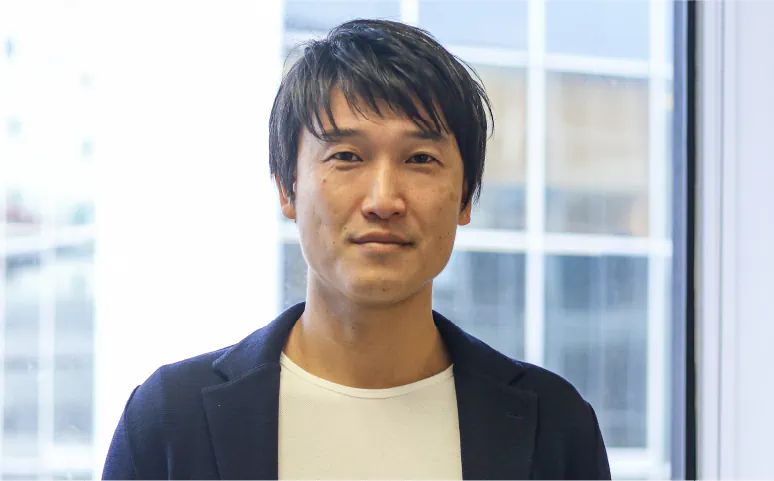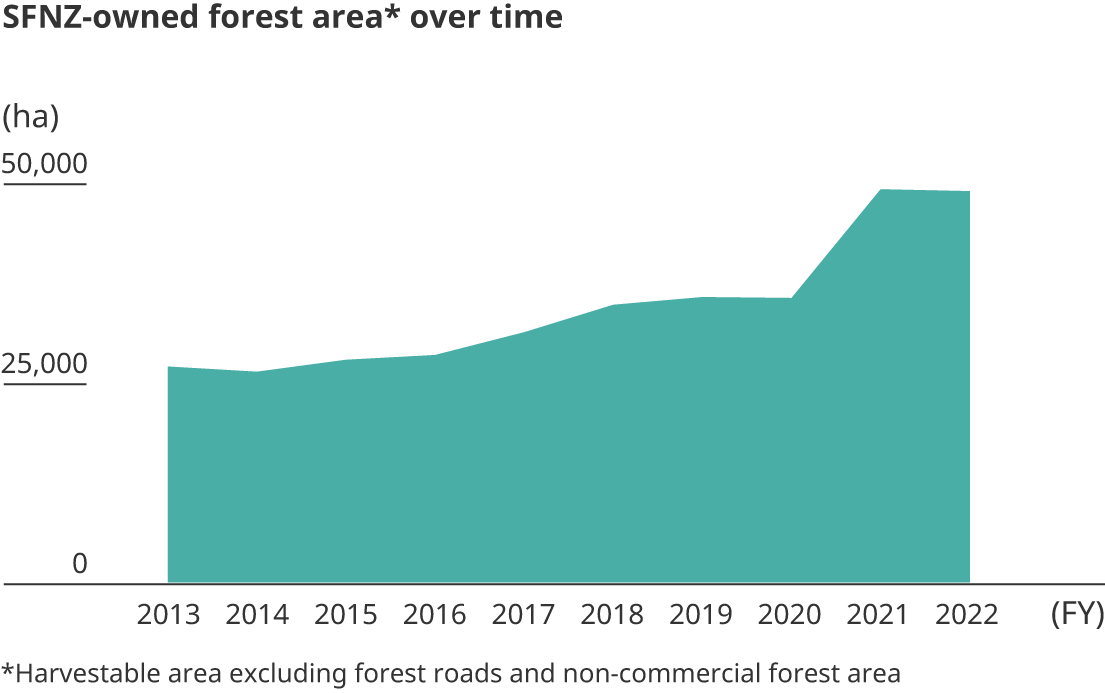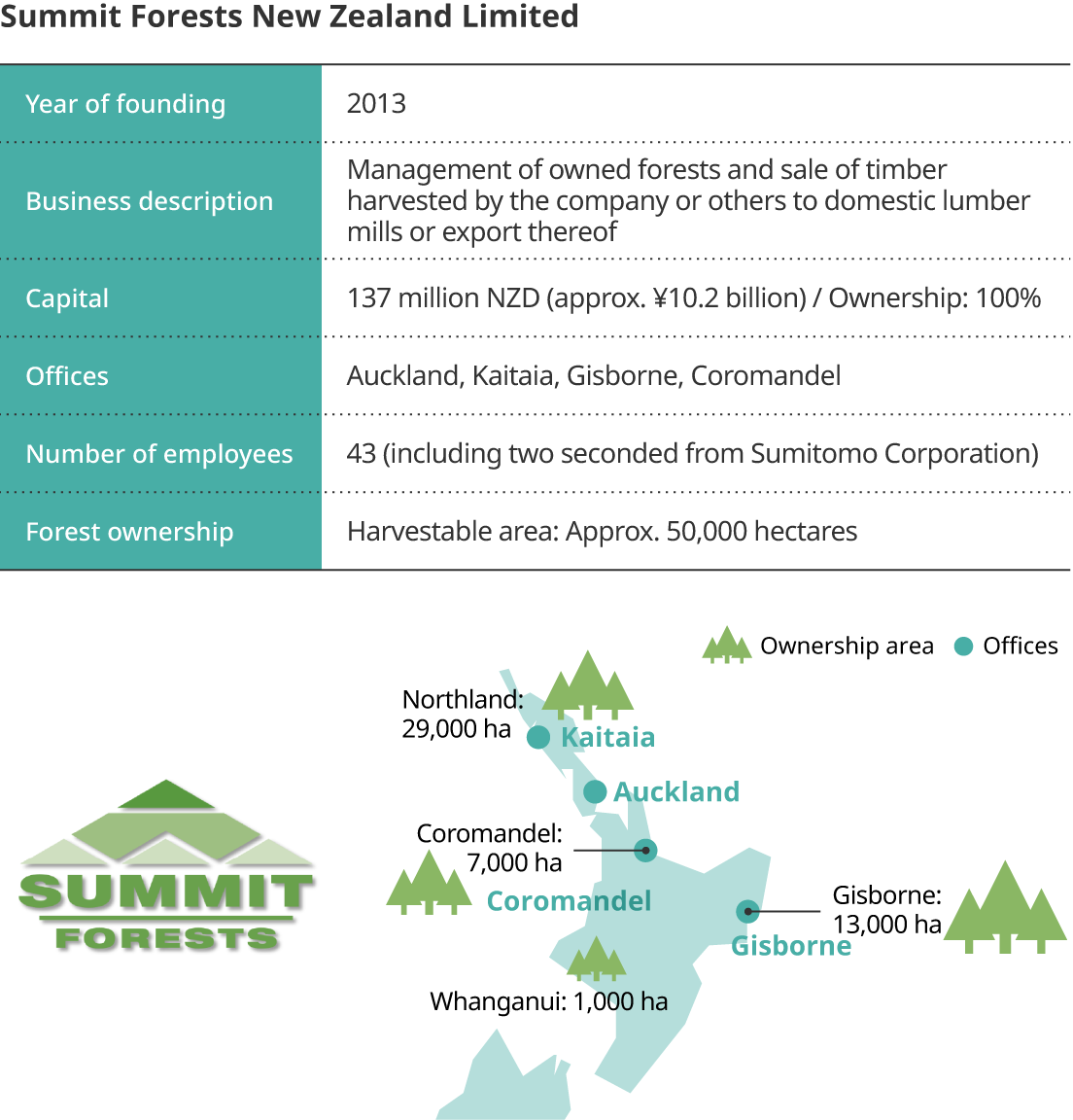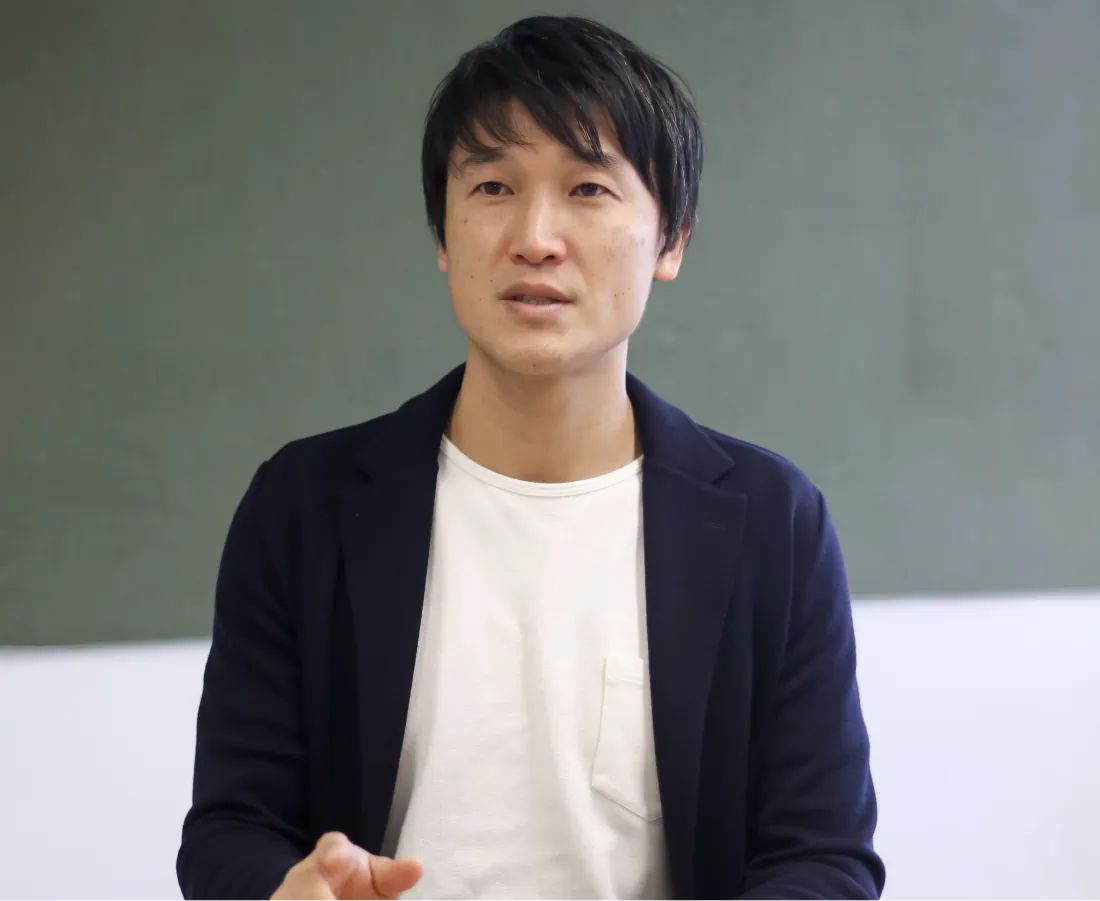Interview Key Social Issue | Mitigation of climate change
Forestry
Contributing to carbon neutrality through forest management looking ahead 100 years
Forests are essential assets for the planet, contributing to carbon neutrality through the capture and storage of CO2, as well as providing functions such as water storage and conservation of biodiversity. However, in recent years, the global forest area has been in continuous decline. Over the past 30 years since 1990, the world has lost 178 million hectares of forests, which is equivalent to about five times the land area of Japan. To maximize the CO2 capture function of forests, which is becoming increasingly important, and to leave these assets to the next generation, it is essential to manage the business from a long-term perspective, repeating the cycle from afforestation to harvesting over and over again. Based on our 400-year history as the Sumitomo Group and 100-year history as Sumitomo Corporation, we look ahead 100 years from now, taking on the challenge of sustainable forest management in New Zealand. Here, the Managing Director of New Zealand-based subsidiary Summit Forests New Zealand Limited (SFNZ) shares his thoughts on the significance and future outlook of the business.
Interviewee

Kenji Okawa
Managing Director, Summit Forests New Zealand Limited
Joined Sumitomo Corporation in 2006. After working in the import/export of exterior wall materials in the Lumber & Building Materials Department of the Construction & Real Estate Division, he went to Russia in 2009 to study for two years under the language trainee program. After returning to Japan, he was placed in charge of administrative and sales work for Russia-related business in the Wood Resources Business Department. After the acquisition of SFNZ by Sumitomo Corporation in 2013, he was in charge of SFNZ's business management at the Head Office in 2014 and was transferred to SFNZ in 2017 as Manager of the Corporate Planning and Business Development. In April 2023, he was appointed Managing Director of SFNZ.
Why
Focusing on the environmental value of forests and timber and expanding the business into forest management
Forests have the function of capturing CO2 from the atmosphere and storing it. Moreover, wood produced by forests is a recyclable resource that can be perpetually regenerated through the repetition of planned logging and forest growth. Forests are becoming increasingly important as the world pursues carbon neutrality to resolve the issue of climate change.
Sumitomo Corporation, which has been involved in the timber import business since Japan's high economic growth period, expanded its business into forest management in the 2000s and has since been working to secure and utilize forest resources in a more sustainable manner. Today, by leveraging the knowledge and expertise we have cultivated in forest management over the years, we are working on promoting sustainable forest management and expanding global forest resources.

What&How
Owning vast forest assets amounting to roughly 50,000* hectares in New Zealand
Taking advantage of its mild climate, New Zealand is a country with an advanced forestry industry where systematic afforestation and logging are carried out to realize effective use of forest assets and achieve harmony with the global environment. In 2013, Sumitomo Corporation acquired forests in New Zealand and established Summit Forests New Zealand Limited (SFNZ)to enter the forestry business there.
SFNZ owns vast forest assets amounting to approximately 50,000 hectares in New Zealand, making it one of the largest trading companies in the forestry business. Within these Limited forests, we plant and grow radiata pine, a species of pine tree, in a 30-year cycle. The harvested timber is sold domestically in New Zealand as packaging material or construction supplies and also exported to China and South Korea. After logging, we reforest most of the land, except for some areas where reforestation is not contractually permitted, to protect and nurture the forest over a long period of time.
Since its founding, SFNZ has accumulated expertise in forest management and developed a sustainable forestry business.
* Harvestable area (excluding forest roads and non-commercial forest areas from the forest area owned)

Thinning in SFNZ forest area
Maintaining healthy forests into the future through proper management
To grow healthy forests and acquire quality timber, it is not enough to simply plant seedlings. In addition to tasks such as thinning, where trees are thinned out to adjust forest density, and pruning, where poorly developed branches are removed during tree growth, forest management requires soil management, monitoring of vast forest areas, management of data on tree growth conditions, and disaster prevention. Managing forest properly in this way helps to protect healthy forests over the long term, which also leads to stable capturing of CO2.
Moreover, forest management involves a 30-year cycle from planting to harvesting, so economic benefits are only generated 30 years after planting. As such, business operations require capital strength to sustain operations over the long term and a strategy that looks ahead to the future. It is in these areas that Sumitomo Corporation's cultivated strengths come into play. We also believe that there will be opportunities for further business expansion in the future, including selling the CO2 capturing function of forests as credits.
In our future business activities, we will focus on automation of logging, planting, pruning, and other operations. We will also put our energy into the promotion of DX, including introducing drones and automatic measuring technology, to reduce costs and improve safety. Grounded on this, we will sustainably manage and operate our vast and rich forests in New Zealand.
Building strong relationships
In the forestry business, Sumitomo Corporation not only considers the 30-year cycle from afforestation to harvesting but also looks ahead to the next 100 years, taking a long-term approach to business management. In our business development in New Zealand, it has not been simply financial strength but also the ability to articulate the strategy and vision from a long-term perspective based on history that has underpinned our business.
The majority of SFNZ's business sites are on land owned by the Maori, the indigenous people of New Zealand. Building a relationship with them is thus essential for conducting our business. The Maori people hold both history and this land in extremely high regard. As such, as a way of communicating our Company's stance of business management with a long-term perspective, we shared with them the story of the 400-year history of the Sumitomo Group and about the large-scale afforestation the Group carried out in response to the air pollution from smoke produced by the Besshi Copper Mine during the Meiji era (1868-1912). The Maori people were interested to hear about our history and future outlook and expressed appreciation for the fact that we will be committed to efforts over the long term. This is when I feel that we have a mutual interest with the landowners. Discussions based on a long-term perspective also help nourish a sense of trust in business dealings among our local partner companies entrusted with forest operations. Furthermore, SFNZ conducts biodiversity conservation activities*, such as breeding and reintroducing the national bird of New Zealand, the kiwi, into the forests, as well as promoting coexistence with wild horses. The local community has expressed appreciation for these activities. Such initiatives are the foundation upon which we build strong relationships with the people of New Zealand.
*The biodiversity conservation initiatives at SFNZ were analyzed as a pilot test for the Taskforce on Nature-related Financial Disclosures (TNFD). Please refer to the ESG Communication Book 2023 (ESG Data,page 73) for the details.
The one hundredth kiwi was released into the Whangapoua forest area in Coromandel in 2023
Going forward
Looking ahead to the future and tying daily efforts into business expansion and realization of carbon neutrality
I believe that the forestry business itself cannot be operated without the perspective of sustainability. When making decisions about the business, I always keep in mind the question, “Is it sustainable?” Every year, SFNZ plants trees on 700-800 hectares of land, roughly the same size as the area logged. The moment these trees are planted, we become responsible for their proper management for the next 30 years. If we cannot keep the business going for 30 years or manage these trees properly, then we should not plant them. Each decision comes with great responsibility, so I consider them carefully. This is a business that must be operated long term, and when considering what is important, I think it is looking ahead to the future and moving forward one day at a time. SFNZ currently has a good group of people who are serious about the future of forestry. As the Managing Director, I hope to create an organizational culture in which everyone who has gathered as a part of this group can continue to enjoy their work each and every day and to make Sumitomo Corporation's presence felt here in New Zealand. I believe that this will lead to the realization of carbon neutrality and further business expansion.

Interviews
- ../card/CO2-reduction-interview.html
- ../card/storage-battery-interview.html
- ../card/bio-interview.html